Nobel Laureate Condemns Iran’s Presidential Elections from Prison

Iranian Nobel Peace Prize laureate Narges Mohammadi denounced the upcoming June 28 snap presidential election in Iran, calling it a facade orchestrated by an oppressive regime.

Iranian Nobel Peace Prize laureate Narges Mohammadi denounced the upcoming June 28 snap presidential election in Iran, calling it a facade orchestrated by an oppressive regime.
In a message from Evin Prison in Tehran on Saturday, Mohammadi said:
“I will not participate in the illegal elections of the oppressive and illegitimate government.”
Mohammadi questioned the integrity of the elections, highlighting the contradiction in the government's actions.
“How can you, while holding a sword, gallows, weapons, and prisons against the people with one hand, place a ballot box in front of the same people with the other hand, and deceitfully and falsely call them to the polls?”
Mohammadi further criticized the true intent behind the elections:
“The only purpose of holding elections for a regime that believes in repression, terror, and violence as the sole means to maintain power is not to uphold democracy and the rights of the people but to consolidate power and tyranny. Such elections will not bring legitimacy to the Islamic Republic.”
Six hand-picked candidates approved by Iran’s Guardian Council have been allowed to run in the presidential elections amid strict media control, while Iranian media and government officials admit a low level of voter interest.
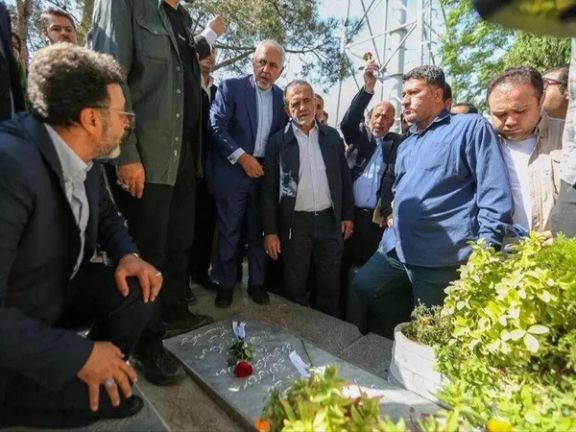
The families of Flight PS752 victims, downed by IRGC missiles in 2020, say they are outraged by the recent visit of Iran's former Foreign Minister Javad Zarif to the graves of victims in Esfahan.
“The presence of Javad Zarif at the graves of our loved ones is outrageous,” the families’ association said in a statement.
“Javad Zarif is one of the individuals involved in covering up the crime of January 8, 2020, and the visits of any of the perpetrators and instigators of the crime to the graves of our loved ones once again demonstrate that the impudence of the officials of the Islamic Republic knows no bounds,” the statement added.
The Ukrainian Airline flight took off from Tehran in the early hours of that faithful day and minutes later two anti-air missiles fired by the IRGC downed the plane. For three days the authorities tried to cover up the incident, claiming a mechanical problem with the aircraft, until videos emerged showing the moment of impact. Zarif was foreign minister, and was heard saying that if the military had told him the truth earlier, he could have helped explain away the the incident.
It also said that Zarif and other authorities responsible for the downing of flight PS752, from IRGC Aerospace Chief Amir-Ali Hajizadeh to IRGC Chief Hossein Salami, and from the operator to Ali Khamenei, must be tried in a fair court.
”That day will come,” the statement said. “We neither forget nor forgive the perpetrators and instigators of this crime.”
Javad Soleimani, a member of PS752 Association’s board, earlier referred to Zarif and presidential candidate Masoud Pezeshkian who visited the graves together as "puppets" participating in Iran's "election circus."
Pezeshkian is backed by groups within regime politicians who are known as 'reformists' and he is running as a 'moderate.' Zarif, coming out of political retirement after three years, has joined the candidate, urging a reluctant electorate to vote for him. The visit to the resting place of the crash victims is seen as a campaign stunt by Pezeshkian, but Zarif's presence has angered many.
The Association’s statement drew attention to a controversial audio file leaked in 2021 in which Zarif was heard suggesting that the PS752 downing was likely unintentional.
"We will not forget the audio file of Zarif saying it was unlikely that the downing of the Ukrainian plane was intentional but if it was, they could tell us so we can ‘remedy’ it," Soleimani stated on X on Friday.
In the leaked audio file, Zarif was also captured stating that the truth surrounding the downing of PS752 would never come to light. Iranian officials attributed the downing of PS752 to "human error".
The flight PS752, which was shot down by the Islamic Revolutionary Guard Corps (IRGC) in January 2020, claimed the lives of 176 passengers and crew, including Soleimani's wife, Elnaz Nabiyi.
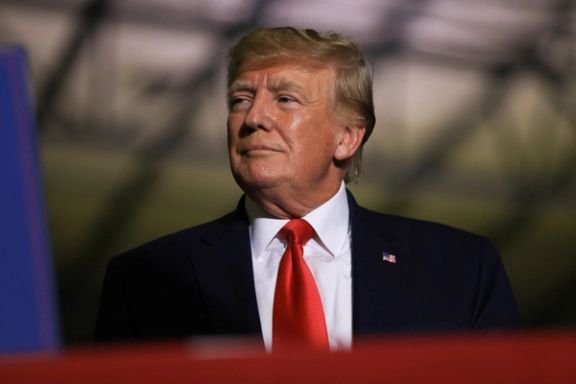
Former US President Donald Trump says he was ready to “make a deal” with Iran on “everything” toward the end of his term, claiming that Tehran also “wanted” a deal because the country was in dire straits as a result of his tough sanctions.
“Iran was broke. They had no money. I sanctioned the countries that wanted to buy oil from Iran. And I would’ve made a fair deal with Iran. I was gonna get along with Iran,” Trump said on the All In podcast Thursday.
“The deal was simple: Iran can’t have a nuclear missile. It cannot have that nuclear capability. Other than that we talk about everything. They would’ve been very happy,” he added.
These remarks might surprise or alarm many Iranians who have been following the US presidential campaign, assuming that a Trump win over Biden could mean a dramatic shift in policy towards Iran and exerting more pressure on the Islamic Republic.
Joe Biden and Donald Trump will go head to head next week in their first presidential debate in the run up to the election in November. Trump’s words Thursday was a glimpse into what may be coming in that debate, as far as foreign policy and relations with Iran are concerned.
“I had them at a point where you could’ve negotiated,” Trump said about Iran. “A child could have made a deal with them. And Biden did nothing.”
Biden won the 2020 election with an explicit promise to revive the 2015 nuclear deal that president Trump abandoned in 2018. In pursuit of the ‘revival’, the Biden administration reversed Trump’s 'maximum pressure' sanctions campaign and, in effect, allowed Iran to sell its oil, mainly to China utilizing its ‘shadow’ fleet.
“A young man that does nothing, or a young woman that does nothing in kindergarten could’ve made a deal with Iran at that time. Because they wanted to make a deal. And Biden never took advantage of it,” Trump said in the podcast lambasting Biden.
“Now… China buys billions and billions of dollars of oil every month… And now they’re much tougher to deal with.”
Critics of president Biden's Iran policy also make the point that by being "soft" on the Islamic Republic he allowed Tehran to recover from Trump's pressure and have resources not only to expand its nuclear program to a dangerous level but also strengthen its proxy forces in the region. Some argue that if Iran had remained under severe financial strain Hamas would not have been able to attack Israel on October 7.
This is a line that many expect Donald Trump to use more often towards the November election, especially as US policy on Iran is inextricably linked to Israel and the ongoing war in Gaza and the wider crises in the Middle East.
“Towards the end of my term… there was no terror going on,” Trump said when asked about October 7th and the attack on Israel. “That attack would’ve never happened in a million years. Iran didn’t have the money for Hamas. They didn’t have the money for Hezbollah… Iran was broke, I say respectfully.”
Donald Trump also said he thought Iran would have "eventually" joined the Abraham accords, which saw the UAE and Bahrain sign 'normalization' agreements with Israel. It was the first such agreement since Israel's peace treaty with Jordan in 1994.
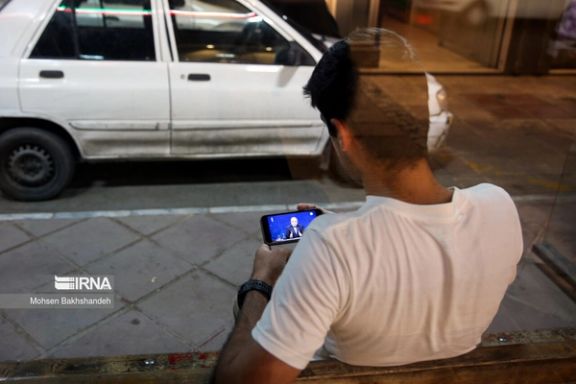
The third round of Iran's presidential debates focused on cultural issues, with the government's treatment of women and internet restrictions being the main points of contention.
Candidates took turns discussing the brutal crackdown on women defying the mandatory hijab, despite their own roles in intensifying the enforcement.
Mohammad-Bagher Ghalibaf, the current parliament speaker, Masoud Pezeshkian, a member of parliament, and Tehran mayor Alireza Zakani are all directly involved in the new regulations the Islamic Republic is crafting to maintain control over Iranian women's public appearance.
For the past 45 years, Iran's clerical rulers have imposed stringent Islamic laws, regulations, and punishments to control citizens' private lives.
A dress code, including mandatory hijab and unequal rights for women, religious indoctrination in schools, a ban on alcoholic beverages, and medieval punishments like flogging for minor offenses – all were imposed on a society rapidly modernizing before the 1979 revolution.
Many Iranians, particularly Generation Z, reject some or all of these religious rules defined by Iran's Shia clerics. This rejection fueled the nationwide anti-regime protests in September 2022, sparked by the death of a 22-year-old woman in police custody for "improper" hijab.
Iran’s Generation Z in particular mostly reject a religious state and seek a secular government that would allow them social freedoms, such as enjoying music and dancing.
The candidates' statements displayed an ambivalence. On the one hand, they defended women's autonomy in choosing their public attire. On the other hand, they defended the government's crackdown on those who defy the mandatory dress code.
Since the 2022 nationwide protests, harshly suppressed by security forces, enforcing the hijab has become a significant challenge. Women increasingly appear in public without it. The government has implemented various measures to enforce hijab, and the parliament and the Guardian Council are wrangling over a new law to penalize women who defy it. Punishments include using surveillance cameras to identify these women, blocking their bank accounts, and withholding services – tactics used for humiliation.
No candidate offered a clear solution for Iranian women who oppose the government's dress code. Founded in 1979, the Islamic Republic is the only Muslim-majority country besides Taliban-ruled Afghanistan with such a strict interpretation of hijab and nationwide coercive measures for its observance. This occurs despite Islam being the official religion in 26 countries across Asia, sub-Saharan Africa, North Africa, and the Middle East.
Internet restrictions were also a topic of debate. Some candidates criticized the blocking of hundreds of websites and popular social media platforms. However, most proposed developing a national intranet under state control.
Even Masoud Pezeshkian, the reformist-backed candidate, defended the government's "intervention" in internet access, justifying shutdowns during national crises. "When intervention is necessary in a specific crisis, I will intervene," he stated. The Islamic Republic has a history of cutting off the internet during nationwide protests.
Pezeshkian claimed that all countries intervene in internet access, a frequently repeated but inaccurate defense by Iranian officials. He further argued that use of VPNs by citizens facilitates access to "obscene" content.
The candidates also threw their weight behind the expansion of Iranian alternatives to international social media platforms and websites, with some of them mentioning specific brands that have been created in Iran as the country has blocked the access of people to the free internet.
In the face of such restrictions, most Iranians have started using VPNs (filter breakers) to access the global internet, leading to the creating of a huge market for such services.
Mustafa Pourmohammadi said during the debate that the financial turnover of VPNs is 50% of the financial turnover of cyberspace in Iran.
There are no precise statistics on the financial turnover of VPNs in Iran. The latest estimates are between 200 and 300 trillion rials per year (about $500 million).
Pourmohammadi, like several other candidates, has been pledging to remove the country’s restrictions on the internet but such restrictions are not under the control of the president. Earlier in the day, Iran's Minister of Information and Communications Technology refuted presidential candidates' promises to lift internet censorship, stating that the president does not have the authority to make that decision.
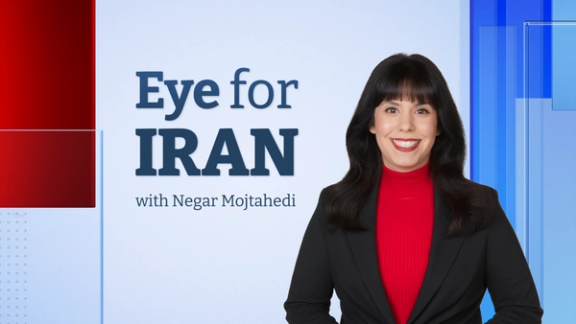
Convicted war criminal Hamid Nouri is back on Iranian soil after being released by Sweden in a prisoner swap deal with Tehran on June 16.
In this week’s episode of ‘Eye for Iran,' we discuss how Iran’s hostage diplomacy is outplaying the West.
Host Negar Mojtahedi spoke with Iranian-Canadian human rights lawyer Kaveh Shahrooz whose uncle, Mehrdad Ashtari, was killed during the 1988 massacre of thousands of political prisoners that involved Nouri.
Alongside Sharooz is Mariam Claren, a German-Iranian fighting for her mother, Nahid Taghavi, a German national who has been unlawfully detained in Iran’s notorious Evin prison since 2020.
Shahrooz was a young child in Iran when his mother’s brother was imprisoned, tortured and hanged as a political dissident - to this day he said he doesn’t even know where he’s buried.
Nouri’s conviction of crimes against humanity, under universal jurisdiction, for his role in the 1988 massacre that saw more than 5 thousand political prisoners killed, was a modicum of justice for Shahrooz and other families.
He said “the fact that somebody was finally meant to pay for this crime was meaningful,” but now after Nouri’s release, he feels “deeply hurt” and “abandoned."
Claren, whose mother - a retired architect, remains in Evin prison in the same ward as Noble Peace Prize winner Narges Mohammadi, said the West should not give into hostage diplomacy. She said her own mother, wouldn’t want to be exchanged in such a way.
She questions why Ahmadreza Jalali, a Swedish-Iranian doctor on death row in Iran, was excluded from the prisoner swap.
“Maybe he just wasn’t Swedish enough,” said Claren.
Claren said “we should address the elephant in the room. Why did Johan Floderus, who is part of an EU delegation of the Middle East, who knows about the hostage diplomacy in the Islamic Republic of Iran, travel as a tourist to Iran?”
For more, watch or listen to Episode 3 of 'Eye for Iran.'
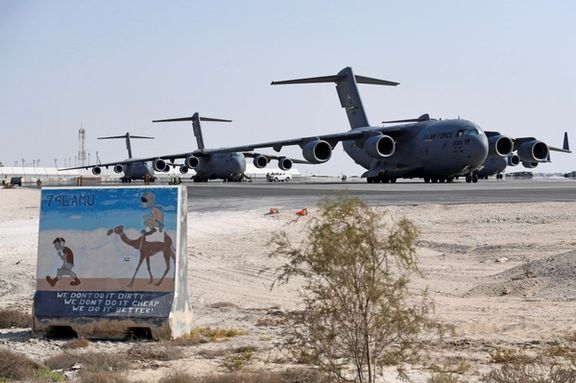
In early 2024, as the US and Qatar quietly extended the use of America’s largest military base in the Persian Gulf, they appeared united in their support for US military activities from Al Udeid Air Base.
This unity persisted until April, when the Islamic Republic of Iran launched a massive rocket and missile attack against Israel.
Qatar declared, according to an April report in the Iranian government-controlled media, that the US is barred from using its airspace in Qatar. Doha hosts key leaders of the Iran-backed Hamas terrorist designated organization.
In one of the starkest signs of Qatar impeding the US from defending its allies in the Mideast and American national security interests, the Middle East Media Research Institute (MEMRI) published on Thursday a scarcely noted 2012 interview with Qatar’s former Prime Minister Hamid bin Jassim, who said Qatari foreign policy prohibits military operations against Iran.
Hamad bin Jassim (HBJ) told the Qatari-owned Al-Jazeera Network in an April 1, 2012 interview that “The Iranians and the Americans know that we oppose any military action against Iran." When asked by Al-Jazeera "Will the Americans ask for your permission?,” the former Prime Minister said "The Americans know that we will not accept any hostile action from Qatar, against any neighboring country, especially against Iran."
Al-Jazeera said, "There is now escalation between Iran and the US. Couldn't the Al-Udeid Air Base be used to...", prompting HBJ to stress "I have told you that we will not accept – I am saying this clearly and underlining it twice... We will not accept any hostile action against Iran from Qatar. Full stop."
HBJ’s statement appears to render the Al-Udeid base futile against one of America’s principal enemies, the Islamic Republic, which the US has consistently designated a state-sponsor of terrorism since 1984.
Rich Goldberg, who served on the National Security Council during the Trump administration, told Iran International, “There’s little value in having a base right next to our greatest threat in the region if a primary condition for having the base is that it can never be used to confront that threat.” Goldberg is a senior advisor for the Washington-based Foundation for Defense of Democracies.
When approached by Iran International for a comment, a US State Department spokesperson said, “We refer you to US CENTCOM for comment on Al Udeid. We refer you to the Government of Qatar for comment on their policy.”
However, in response to an Iran International press query CENTCOM, a US defense official, said " We have no additional information to provide as this topic is not a Department of Defense decision. Therefore, we defer you to the U.S. State Department for comment."
Iran International reported in October, after the Iran-backed Hamas movement invaded Israeli border regions and killed 1,200 people, including over 30 Americans, Mohammad Bagheri, the chief of staff of Iran’s armed forces, asked Qatar’s defense minister for Doha to deny the US the use of its Al-Udeid airbase.
Qatar’s disruption of US military activity may have also weakened the US response to the Iran-backed militia, Kataib Hezbollah, in Iraq that murdered 3 US soldiers in Jordan in late January.
Retired US Navy Intelligence Commander, Jennifer Dyer, noted on her website, the “The Optimistic Conservative” in February, ”It’s possible that no Air Force strike-fighters from Al-Udeid participated. If that’s the case, the likely reason is that Qatar wouldn’t allow it.” Dyer added, “The silence from Al-Udeid doesn’t bode well...for the U.S. ‘option’ of attacking Iran’s nuclear weapons program. Doing that would involve a huge target set, not even so much for the nuclear weapons program itself as for neutralizing Iran’s air defenses and means of retaliation.”
Qatar and the Islamic Republic share the vast South Pars gas field in the Persian Gulf and this may be a reason why the supremely opulent gas-rich nation of Qatar has gone to great lengths to not pick fights with Iran’s clerical regime.
The two countries have drawn closer in recent years. Israel’s former president Reuven Rivlin delivered a dossier about Qatar’s alleged role in funding Iran’s Islamic Revolutionary Guard Corps to president Joe Biden in 2021. The US said at the time it would investigate the dossier.
The new MEMRI translation of HBJ’s Arabic-language interview sparked intense criticism from American and Israeli security experts.
Ezra A. Cohen, a former US Department of Defense official, wrote on X, formerly known as Twitter,that “Every day it becomes more and more clear that Qatar is holding the United States hostage.”
The popular Israeli journalist and commentator, Caroline Glick, wrote on X “The Biden administration does not designate Qatar a state-sponsor of terrorism, despite the fact that it is one of the largest state sponsors of terrorism. No. The administration designated Qatar a major non-NATO ally, which it decidedly is not.”
Qatar is in the crosshairs of many US Senators and Congressional representatives for its support of the US-designated terrorist movement Hamas. There are increasing calls on Capitol Hill for Biden to reexamine America’s alliance with Qatar and consider the relocation of the Al-Udeid base to another state in the Mideast that is not embroiled in funding Islamist terrorist movements.
MEMRI president and founder, Yigal Carmon, argues that Qatar is the single largest state-enabler of both Sunni and Shiite Islamist terrorist movements across the globe. Carmon termed the Qatari Emir Tamim bin Hamad Al Thani’s government a “dishonest broker” who should not be involved in the effort to secure the release of Hamas held hostages in the Gaza Strip.
Qatar’s ambassador to the US, Meshal bin Hamad Al Thani, did not respond to an Iran International press query. Iran International sent multiple email press queries to Qatar’s embassy in Washington.